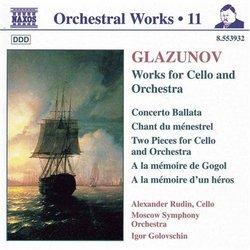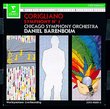| All Artists: Alexander Glazunov, Igor Golovschin, Moscow State Symphony Orchestra Title: Glazunov: Orchestral Works, Volume 11 Members Wishing: 0 Total Copies: 0 Label: Naxos Release Date: 9/28/1999 Genre: Classical Styles: Forms & Genres, Concertos, Symphonies, Instruments, Strings, Symphonies Number of Discs: 1 SwapaCD Credits: 1 UPC: 730099493222 |
Search - Alexander Glazunov, Igor Golovschin, Moscow State Symphony Orchestra :: Glazunov: Orchestral Works, Volume 11
 | Alexander Glazunov, Igor Golovschin, Moscow State Symphony Orchestra Glazunov: Orchestral Works, Volume 11 Genre: Classical
|
Larger Image |
CD DetailsSimilarly Requested CDs
|
CD ReviewsGlazunov in a Reflective Mood Thomas F. Bertonneau | Oswego, NY United States | 10/28/2000 (5 out of 5 stars) "Norman Lebrecht, in his otherwise sympathetic entry on Alexander Glazunov (1865-1936) in "The Companion to 20th Century Music," calls the once famous and ever sweet Violin Concerto (1904) "unreflective." He means, I'd guess, that a work written as late as the Violin Concerto and in an idiom so backward-looking could only be fully justified by some infusion of irony or self-awareness. The very late Saxophone Concerto (1936) is full of irony and self-awareness. While one would not call the large-scale Concerto-Ballata for Cello and Orchestra (1931) "ironic," exactly, it does seem to qualify as self-aware - in much the same way as Elgar's valedictory Cello Concerto (1919), from just after the war, is self-aware. Like Elgar, Glazunov knew that his time had passed, that his natural idiom spoke for a world that no longer existed, and that anything he wrote would, after Revolution and emigration, be drenched with sorrow for the grand calamity of it all. Such thoughts indeed drew from Glazunov one of his finest works, certainly the most balanced and emotionally convincing of his concerted works. The soloist's improvisatory, minor-key, deeply Slavic line leads to brief reminiscences of the composer's old, "Imperial" style, with heralding trumpets and ceremonious clarinets; but the melancholy tone predominates, and the composer works it out in a variety of touching and mostly quiet episodes. The music is "reflective" in just the way it is not, as Lebrecht sees it, in the Violin Concerto. I hope that Alexander Rudin's moving performance of the Concerto-Ballata prompts other cellists to take the work into their repertory. This is a great 20th century solo vehicle. The program on this disc includes the better known and much shorter "Chant du Ménestral" (1900), of which there are usually several recorded performances floating around. The "Two Pieces for Cello and Orchestra" (1887 and 1888) are pleasant if unremarkable. Finally, we hear two substantial works for orchestra alone: "A la mémoir de Gogol" (1909) and "A la mémoir d'un héros" (1885). The former is the best. Buy the disc for the beautiful Concerto-Ballata."
|

 Track Listings (6) - Disc #1
Track Listings (6) - Disc #1








